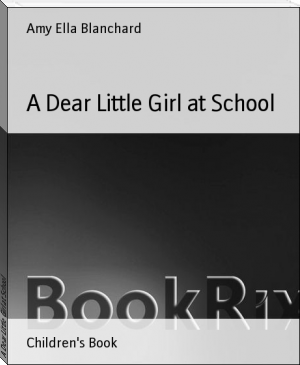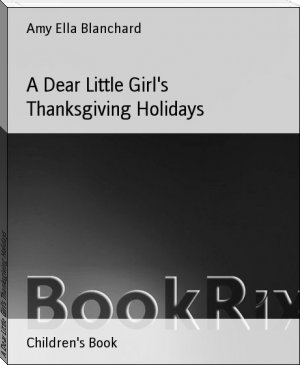Little Maid Marian - Amy Ella Blanchard (the best electronic book reader .txt) 📗

- Author: Amy Ella Blanchard
Book online «Little Maid Marian - Amy Ella Blanchard (the best electronic book reader .txt) 📗». Author Amy Ella Blanchard
"You poor little pet, of course you don't, but once you begin sending letters back and forth it will be quite different."
"Yes, I think so, too. Miss Dorothy, do you suppose my father will ever come home?"
"I don't know why he shouldn't."
"I do; it is because grandpa will not ask him to. I think grandma would like to, but grandpa won't let her; that is what I think, and I believe Mrs. Hunt thinks so, too."
Miss Dorothy was silent for a moment, then she said: "Perhaps we'd better not talk about it, dear, for I don't know the circumstances, and I might not judge correctly, but if it is right that he should come, I think your writing to him will be the surest way of bringing it about the sooner. Shall we write the letter this afternoon?"
"Oh, please."
"Then come to my room in about an hour and we'll try it."
Marian was promptly on hand when the hour arrived, and seated herself in a great twitter before the machine. She began bravely enough: "My dear father," and then she paused, but slowly went on till she had completed half a page of typewritten words. Miss Dorothy did not offer any suggestions, but sat at the other side of the room before her writing-table. At the pause in the clicking of the typewriter she looked up. "Well," she said, "you haven't finished yet, have you?"
"I don't know," responded Marian doubtfully. "Would you mind looking at what I have done?"
Miss Dorothy came over and read the few stiff lines:
"My dear father: I have learned to write upon the typewriter which belongs to my teacher. I hope you are well. I am well and so are the rest of the family. We have very pleasant warm weather at present. I hope you have the same in Berlin. I thought you might be pleased to receive a letter from me, although it is not the first of the year. I go to school now. There are twenty pupils in our room. They are all little girls."
"Oh, dear, dear," exclaimed Miss Dorothy, "is that the way you feel when you are writing? Why, you are talking to your father, remember. Just listen to the way I write to mine." She read from the sheet she held in her hand:
"Dear old daddy: Isn't this gorgeous weather? I wish you and I were off for a real old time tramp this afternoon. How we would talk and turn our hearts inside out to each other. I can see you with your eyes twinkling under that disreputable old hat of yours, and I can feel your polite hand under my independent elbow when there is a stream to jump or a wall to climb, the dear hand that I never need for that sort of help, but which you pretend I do because I am your girl still, if I am big enough to face the world by myself.
"Well, daddy, I have been teaching for more than a week, and haven't had one cry over it. Isn't that courage for you? Not that my pupils are all angels, oh, no, this is not heaven, dear dad, but it is really a very nice place, and there are some dear people here.
"Did you ever happen to meet a Mr. William Hunt and his wife? He is a very good sort, and she is a perfect darling, one of those rare flowers whose fragrance fills the air even on the highway; not one of the hothouse kind that has been forced to bloom out of season, for out of season and in season she is always blooming and shedding forth her sweetness." Miss Dorothy paused.
"Oh, but Miss Dorothy, I could never write like that," exclaimed Marian in an awe-stricken tone.
"Perhaps not just like that, but you can tell him about yourself and about the people you know, Mrs. Hunt, for instance, and your schoolmates, and Tippy and Dippy."
"And you?"
"Yes, and me, if you like."
"Oh, very well, I will try again. I didn't know we ought to write letters like that."
"That is the very kind we should write. I will finish mine while you do yours." So for the next few minutes the tapping of the typewriter drowned the scratching of Miss Dorothy's pen, which flew steadily over her paper.
At last Miss Dorothy looked up. "There," she exclaimed, "I have finished mine. How are you getting on?"
"Oh, much better. I have written ever so much. I am almost at the bottom of the page, and I think you will have to put another sheet in for me, if you will be so good."
"I'll do it with pleasure. May I see what you have written, or would you rather not?"
"Oh, please look. I have told him about school and about you and some of the girls. There is a great deal more I could say, but I will leave out Tippy and Dippy this time."
Miss Dorothy read down the page and at the end she stooped and kissed the child. "You have paid me a lovely compliment, dear," she said. "I am glad you feel that way," for Marian had written: "We have the loveliest teacher in the world. Her name is Miss Dorothy Robbins. She is like Mrs. Hunt, but can understand little girls better, for she is younger and prettier. I love her very much."
At last the letter was finished, folded and addressed, and Miss Dorothy promised to mail it herself. It had been a great undertaking for Marian, who was quite tired out by her afternoon's work, but who was very happy now that it was done, for the very act drew her nearer her father.
She went down that same evening to tell Mrs. Hunt about it. There was neither baking nor pickling going on this time, but she found her friend in her sitting-room, a basket of mending by her side. "You are always busy, aren't you, Auntie Hunt?" said Marian. Mrs. Hunt was called Auntie, by many of her friends.
"Yes, dear, I think most busy people are happy, and I am sure all happy people are busy about something. Well, how goes it up at the brick house?"
"Oh, very well, indeed. What do you think I have been doing to-day?"
"Can't guess. There is one thing I know you have not been doing. I'll wager a sixpence you've not been blackberrying," and Mrs. Hunt laughed.
The color flew into Marian's face. "No, indeed, I haven't been, and I shall not probably ever go again until I'm a grown lady, and can do as I please."
"Do you think all grown-ups do as they please?"
"Why, don't they?"
"Not a bit of it. But there, tell me what is the wonderful thing you have been doing?"
"I have written a letter to papa all by myself, and Miss Dorothy has mailed it. She put the stamp on and took it to the post-office just now with her letters."
"Well, well, well, but won't he be pleased to get it? That's a fine young woman, that Miss Dorothy of yours."
"Isn't she?"
"She is so. She made us a nice visit the other evening. She is a girl after my own heart, none of your vain, self-absorbed young persons, always concerned in her own affairs, but one of the real hearty kind that thinks of others as well as herself, and has her eyes open to what is best in life. I like her."
"And she likes you."
"I'm glad to hear it."
"I wish you could see the kind of letters she writes to her father, but then," Marian added thoughtfully, "he must be the kind of father it is easy to write that way to."
"I'll be bound he is the right kind to have a daughter like that. She has no mother, she tells me. Her aunt keeps house for them, and there is quite a family of children."
"Yes, and Patty is the youngest. She is going to write to me."
"Bless me, how you are blossoming out into a correspondent. Well, don't let it take up so much of your time that you won't be able to drop in as often as usual. There is a little basket of grapes in the pantry; you can take it to your grandma; the pear on top grew for you to eat right now."
Marian needed no second hint, but sought out the fruit and was not long in burying her teeth in the yellow juicy pear, and then because it grew dark early, she hurried away that she might be home "before the dark catches you," said Mrs. Hunt.
CHAPTER VII
Patty's Letter
One day a few weeks later Marian ran to Miss Dorothy with a letter her grandfather had just brought in, and when her teacher opened it, she saw her smile as she drew a sheet from within the longer letter. "This is for you, Marian," said Miss Dorothy.
"It is from Patty, I know," cried Marian delightedly, and she took the long-wished for letter over to the window while Miss Dorothy turned her attention to her own home news.
Patty's was a nice cordial little note which told about her lessons and her friends, and which said that she hoped Marian and she would soon meet and be very chummy. "I know I shall like you," wrote Patty, "because Dolly says so, and Dolly is nearly always right."
"I think so, too," said Marian aloud. She took much longer to read her letter than Miss Dorothy did to read hers, for she was not very expert in reading written pages. Miss Dorothy had laid down the closely written sheets which she had been holding, and was looking out of the window thoughtfully when Marian at last came to "Your affectionate friend, Patty Robbins."
"It was such a nice letter," she said looking up with a pleased sigh.
"I am very glad you found it so," returned Miss Dorothy with a smile.
"Was yours a nice one?"
"Yes, it is from my father, and he always writes delightful letters. I hope to see him and Patty both on Saturday. Dad has some business in the city, and Patty needs a new coat, so he is going to take her with him. I am to meet them there, for poor dad would never know how to buy a coat. Do you often go to the city, Marian?"
"I never have been but once."
"Really? I was just thinking how nice it would be if you could go with me and meet Patty; then we three could go shopping and have lunch somewhere together."
"Oh, Miss Dorothy!" Such a plan was beyond Marian's wildest dreams. She looked radiant for a moment, then her face fell.
"What is the matter?" asked Miss Dorothy.
"I am afraid grandma will not let me go. I never have been but that once, and then grandma had to go to the dentist; grandpa could not go with her and didn't want her to go alone."
"But what about your clothes and things? Don't you have to go there for them?"
"Grandma never gets me ready-mades. Miss Almira Belt makes everything I wear. Do you suppose she always will do it?"
"I hope not," returned Miss Dorothy gravely, then she laughed as she pictured a grown-up Marian arrayed in frocks of Miss Almira's make. They





Comments (0)